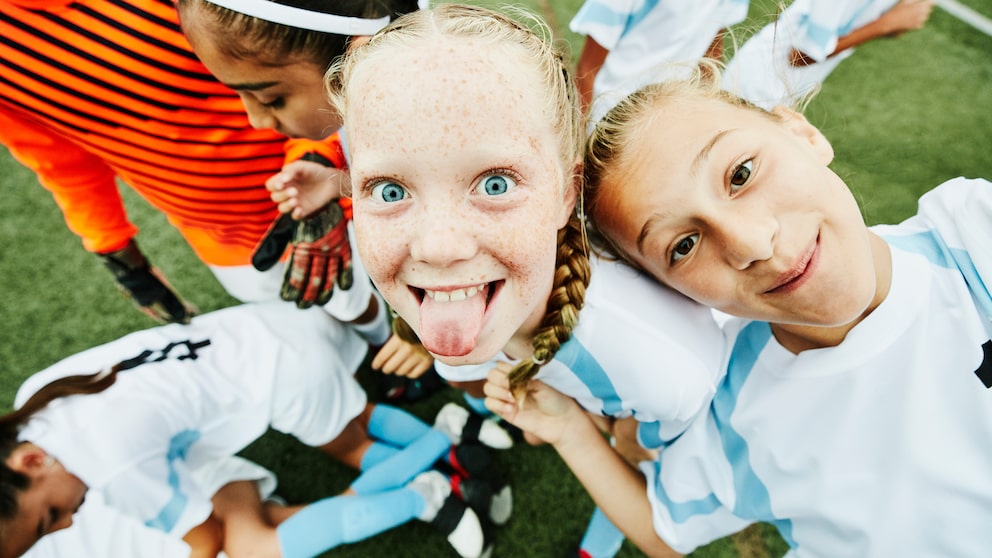October 25, 2024, 1:25 pm | Read time: 4 minutes
Children enjoy sport. Provided it’s a sport that suits them. But how do you actually find out? When should children even start playing sports? And which sports are particularly suitable for children? Sports scientist Prof. Dr. Ina Hunger answered these and other questions for us.
According to current statistics from the World Health Organization, 80 percent of children and young people do not get enough exercise.1 This is alarming, as sports and physical activity are crucial for children’s development. Participation in sports offers numerous benefits, ranging from social to physical advantages. Sports scientist and university lecturer Prof. Dr. Ina Hunger is well-versed in the additional positive effects of sports on the health of children and adolescents, as well as the reasons why children need to remain active.
Overview
When should children start engaging in sports?
A common question among parents is: At what age are children ready for extracurricular sports? When it comes to exercise, which is not an organized sport, the expert says: “Children are born with a natural urge to move, and parents should support this natural and spontaneous need to move right from the start.” The fulfillment of this urge to move is essential for children to test their limits, explore their environment, interact with others, and more.
“Furthermore, satisfying the need for movement is imperative for the healthy development of a child’s body,” adds the sports scientist. According to the expert, it is, therefore, not initially a question of choosing a specific sport but of maintaining the joy of movement in the first years of life and promoting the general ability to move. “At primary school age, children often show an interest in sports,” says the expert. Generally, it is important that children are given the freedom to try out a wide range of activities without restrictions.
What kind of sport is particularly beneficial for children?
It is often claimed that sports can enhance intelligence. After all, sports also have an effect on performance and concentration. However, according to Hunger, one should be rather cautious with these theories. The topic of “the importance of sport for children’s brain development” is usually greatly exaggerated. “Basically, spontaneous movement activities open up many opportunities for young children to gain new experiences and thus new insights. Whether it’s unconsciously gathering information about physical properties with their own body or when handling equipment, and much more,” explains Hunger. However, according to Hunger, this should not immediately lead to the conclusion that sport promotes intelligence. “As far as the promotion of basic motor skills such as strength, endurance, coordination, etc. is concerned, these are, of course, promoted differently in the many different types of sport.” Consequently, the sports scientist advocates for comprehensive foundational training rather than early specialization.
How can parents recognize whether their children have an affinity for a sport and, if so, which one?
“In addition to the physical challenges, every sport also poses psychological and social challenges,” says Ina Hunger. “For example, when playing soccer, I have to act in a large group and assert myself against direct opponents. In gymnastics, on the other hand, I’m alone during the movement. I have to pay attention to a ‘beautiful’ execution of the movement and perhaps also overcome my own fears.” Conversely, fighting is about dominating your opponent physically but sticking to the rules.
“So I learn something different in every sport, not only physically but also psychosocially,” says the expert. Parents should also take these psychosocial aspects into account when choosing a sport for their child. “I recommend offering children as many different activities as possible so that they can feel for themselves and know which sporting setting appeals to them the most.” If a child is enthusiastic about sports and exercise classes, then that is a great prerequisite. A course is always good if the child feels really comfortable there.

Start Your Day Refreshed! This Daylight Trick Helps You Wake Up

How Often Should You Brush Your Teeth?

What Can Be Done About Tailbone Pain
How important is sports for children anyway?
Physical activity is vital because it fulfills a natural need in childhood and plays a key role in the child’s comprehensive development. When children later decide to take up a sport, they learn to act as part of a team, train towards a goal, and deal with victories and defeats. They can develop special physical expertise and much more. However, it is always crucial that the child feels comfortable and that the adults act responsibly for their children’s physical and mental well-being. Sports activities practiced under coercion or in which children feel uncomfortable can be detrimental and may diminish their long-term enjoyment of physical activity.

